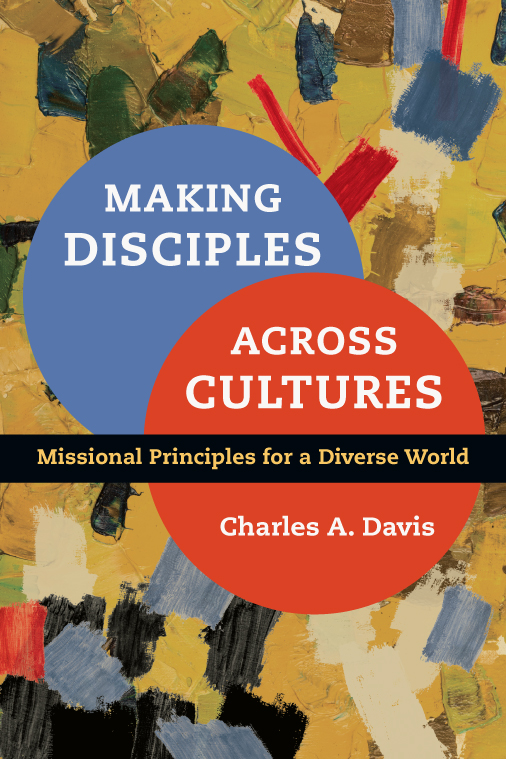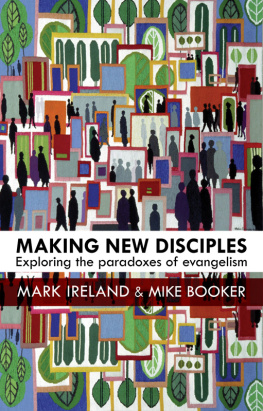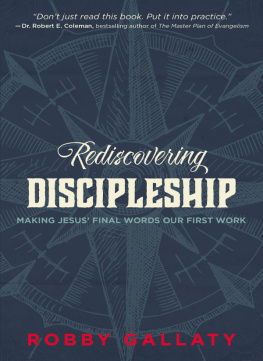Davis Charles A. - Making Disciples Across Cultures
Here you can read online Davis Charles A. - Making Disciples Across Cultures full text of the book (entire story) in english for free. Download pdf and epub, get meaning, cover and reviews about this ebook. year: 2015, publisher: InterVarsity Press, genre: Religion. Description of the work, (preface) as well as reviews are available. Best literature library LitArk.com created for fans of good reading and offers a wide selection of genres:
Romance novel
Science fiction
Adventure
Detective
Science
History
Home and family
Prose
Art
Politics
Computer
Non-fiction
Religion
Business
Children
Humor
Choose a favorite category and find really read worthwhile books. Enjoy immersion in the world of imagination, feel the emotions of the characters or learn something new for yourself, make an fascinating discovery.

- Book:Making Disciples Across Cultures
- Author:
- Publisher:InterVarsity Press
- Genre:
- Year:2015
- Rating:4 / 5
- Favourites:Add to favourites
- Your mark:
- 80
- 1
- 2
- 3
- 4
- 5
Making Disciples Across Cultures: summary, description and annotation
We offer to read an annotation, description, summary or preface (depends on what the author of the book "Making Disciples Across Cultures" wrote himself). If you haven't found the necessary information about the book — write in the comments, we will try to find it.
Making Disciples Across Cultures — read online for free the complete book (whole text) full work
Below is the text of the book, divided by pages. System saving the place of the last page read, allows you to conveniently read the book "Making Disciples Across Cultures" online for free, without having to search again every time where you left off. Put a bookmark, and you can go to the page where you finished reading at any time.
Font size:
Interval:
Bookmark:

InterVarsity Press
P.O. Box 1400,
Downers Grove, IL 60515-1426
2015 by Charles A. Davis
All rights reserved. No part of this book may be reproduced in any form without written permission from InterVarsity Press.
InterVarsity Pressis the book-publishing division of InterVarsity Christian Fellowship/USA, a movement of students and faculty active on campus at hundreds of universities, colleges and schools of nursing in the United States of America, and a member movement of the International Fellowship of Evangelical Students. For information about local and regional activities, visit intervarsity.org .
All Scripture quotations, unless otherwise indicated, are taken from the New American Standard Bible, copyright 1960, 1962, 1963, 1968, 1971, 1972, 1973, 1975, 1977, 1995 by The Lockman Foundation. Used by permission.
While the stories in this book are true, some names and identifying information may have been changed to protect the privacy of individuals.
Cover design: Cindy Kiple
Images: Abstract painting: soleg/Fotolia
Color brush strokes: Jesse Kunerth/Fotoli
Sound mixer board: Grosescu Alberto/ Dreamstime.com
ISBN 978-0-8308-9716-2 (digital)
ISBN 978-0-8308-3690-1 (print)
To all those men and women who
courageously and sacrificially cross cultural boundaries
to make disciples of Jesusapostles all!
T he Evangelical Alliance Mission (TEAM) is associated with approximately twenty-five hundred churches in North America and thousands more in thirty-five countries around the globe. Some of these churches are brimming with spiritual vigor and growth, sending out workers near and far to carry the good news. Many, sadly, seem to be retreating from global involvement. Some have stopped growing altogether.
In late 2010 and early 2011, TEAM leadership spent many hours in prayer, fasting and discussion, asking God for clarity on what we might contribute toward renewal, health and global vision in the churches with which God has given us influence. As we prayed, we began to dig down to the level of our assumptions about the church, discipleship and mission. We began to question the models and methods with which we had been operating for decades. As a result of this prayer-soaked process, God revealed to us ten sets of cultural assumptions which were underneath the disciple-making models or methods used by many, if not most, of the churches with which TEAM is associated.
In 2011, through a series of apparently disconnected events, about thirty TEAM leaders and workers in Europe gathered to hear three days of lectures by Alan Hirsch. In preparation for the lectures we read his book The Forgotten Ways.
The first afternoon, Hirsch described the need to go down to the level of assumptions, just as we had done, if we wanted to see the fundamental changes necessary for the church of Jesus Christ to grow and thrive. Those of us in leadership who had been asking God for clarity on what needed to be changed were amazed.
It was almost as if our leadership team and Hirsch had been working on two ends of the same puzzle. He was working to bring renewal to the church in the West, examining theological assumptions about the church, discipleship and mission. We were working with churches worldwide, examining cultural assumptions that influence our notion of the church, discipleship and mission.
As the puzzle came together, a compelling picture emerged, ultimately resulting in this book.
Then we became increasingly aware of many others who were being led in the same direction, not only in the church in the West, but around the globe. From China to England, new disciple-making methods were emerging, built on different assumptions about the church and disciple making.
Many years ago, I began to realize that when we see a confluence of factors which cannot be explained through human reason, we may well be seeing the hand of God actively directing our affairs. As one colleague said, There is only one Shepherd, and his sheep hear his voice. If we are hearing the Shepherd say something to us, then it is reasonable to expect that he is saying it to other sheep as well.
This book explores ten universal principles of disciple making, focusing on the theological and cultural assumptions that invisibly shape how those principles become reality in a wide variety of cultures.
These thoughts are a work in progress. If Jesus is driving this process forward, we will find many others who have heard the Shepherd speaking to them on the same subject, and we will be able to learn from one another. If these thoughts resonate with you, we would love to work together, led by the Holy Spirit.
Besides TEAM leadership and Alan Hirsch, many others have been companions on this journey. Dietrich Gruen, whom I first met at a Perspectives class, almost single-handedly kept me going in the early months of writing, as well as providing the questions for the study guide. Jim Plueddemann, my mentor and friend, constantly challenged my thinking. A task force of TEAM missionaries representing eight diverse cultures on five continents has been testing many of these thoughts. Dozens of authors have encouraged me along the way, and I have tried to give credit to each. InterVarsity Press provided extremely helpful reviews of the original manuscript. My wife, Kris, and daughter, Bethany, gave me confidence to keep going and helped me hone my writing style. Members of my huddle have prayed for me. Our longtime friends and partners have faithfully contributed and supported me on the journey. Many thanks to all!
I am passionately in love with the body of Christ. That has not always been true.
I grew up in Pakistan, one of three children of missionary parents. After my first grade in the city of Abbottabad (made famous in 2011 by the Navy Seals), the United Presbyterian Mission and The Evangelical Alliance Mission (TEAM) decided to work together to sponsor a school for children of missionaries, called Murree Christian School. Six months of the year, spring and fall, we boarded at an elegant old rest home originally built for English military veterans in the Himalayan foothills. Every school day, we walked a mile from the boarding facility to classes held in a remodeled stone church building built in the Anglican tradition. The three-month break coincided with winter, and during the summer months we lived with our families in rented locations. Against this background, I became a Christian at the age of eleven, praying with my mother. I remember the relief I had and the sense that I had joined something big, but I wasnt sure what that was.
Those were the days when the movement known as Youth for Christ (YFC) was sweeping the United States with rallies, competitions and choirs. Someone thought it would be a good idea to start a YFC group at our school. We held no rallies, and the exciting sound of the radical singing group, the Spurlos, was not possible, but we were able to plan special youth meetings, led by the youth themselves. When I was in the eighth or ninth grade, I was elected president of the small group of students who had decided to form the YFC society of Murree Christian School.
Our job was to plan a meeting together, but what were we to do? Predictably, we did what we had seen done every Sunday morning: someone read a passage of Scripture, someone picked out hymns from the hymnbook, someone prayed and someone talked about the Scripture. Simple. I had no idea what we were trying to accomplish, or what we expected of God. I have since realized that just like some children play house, or some play war, we were playing church. Somehow we had lost the dynamic character of the YFC movement and were going through the motions.
Font size:
Interval:
Bookmark:
Similar books «Making Disciples Across Cultures»
Look at similar books to Making Disciples Across Cultures. We have selected literature similar in name and meaning in the hope of providing readers with more options to find new, interesting, not yet read works.
Discussion, reviews of the book Making Disciples Across Cultures and just readers' own opinions. Leave your comments, write what you think about the work, its meaning or the main characters. Specify what exactly you liked and what you didn't like, and why you think so.







